News for 15 March 2021
All the news for Monday 15 March 2021
Ireland v Great Britain in Match 2 of SoftCo Series.
Chloe Watkins and Shona McCallin of Great Britain Credit ©INPHO/Bryan Keane
The second match of the SoftCo Series in Queen’s University Belfast got underway this evening, with Great Britain bringing a noticeably faster start than the opening of yesterday’s match. However, Ireland remained strong from the off, with Lena Tice making a remarkable on the line save from a well targeted Unsworth shot. McFerran proved to be in strong form in the opening quarter keeping a chance from Rayer from allowing GB to get on the scoreboard, before following up by saving a penalty corner against Ireland shortly after.
The opening quarter held plenty of opportunities for both teams, with Deirdre Duke and Sarah Hawkshaw both finding themselves in the GB circle but failing to secure a goal. GB’s Jones and Ansley also created opportunities for themselves close to the Irish goal, but Jones scuffed her shot while Ansley was defended out. Meanwhile Beth Barr played strongly on the wing creating space and moving the ball up the pitch well.
Colvin and McLoughlin worked well together in the second quarter in midfield. An Owlsey and Robertson attack on the Irish circle resulted in a free out to Ireland. Hawkshaw made herself a nuisance to the GB defence on several occasions but the sides remained level. GB’s Owsley found a gap and went on a long attacking run, McLoughlin followed her and they were met by two more Irish defenders, however the defence resulted in a penalty corner to GB. Toman took the shot on McFerran who saved aptly.
Nikki Evans with possession, passing to Duke who provided Colvin with a real chance on Hinch in the GB goal, however it wasn’t to be and the score remained nil all. Watkins found a gap shortly after and smacked the ball down the pitch, however there was no on hand to receive it and the opportunity passed. A Mullan pass across the GB circle was intercepted by Ellie Rayer who showed serious speed to move it back down to challenge Ireland. GB’s Sarah Evans drove the ball across the Irish goal providing Laura Unsworth a chance to steer it past McFerran to give GB the lead.
A goal down Michelle Carey continued pressing from the left, while Hawkshaw continued from the right, with both intercepted by GB defence in short succession. A chance for Jones again in the Irish circle was scuppered as McFerran deflected out to Tice.
The second half brought high energy from both sides. A Colvin assist to Watkins saw a skilful reverse shot sail past Hinch and hit the backboard for the equaliser. Owsley and McCallin tried to re-instate GB’s lead shortly afterwards, but a McFerran booted the ball out of harms way to keep the sides level. McCay created an opportunity for Duke and Mullan in the GB circle which failed to produce a goal, while GB’s Owsley was kept out of Ireland’s circle by Roisin Upton as the third quarter came to a close.
The final quarter saw Liz Murphy see off a strong challenge from Rayer and Roberston. Nikki Evans secured a lovely play to move back towards the GB circle but was intercepted by Toman. With just over ten minutes on the clock Michelle Carey was given a Green Card, followed shortly after by Shirley McCay receiving a Yellow Card. Despite being two players down Ireland continued to press, with a Watkins attack leading to a penalty corner for Ireland. Watkins’ shot was on target from the penalty corner but Hinch kept the ball out of the GB goal before quickly saving another shot by Anna O’Flanagan.
To add to the drama of the final quarter, a second Yellow Card of the game was given, this time to GB’s Jones. Chloe Watkins providing the assist for Anna O’Flanagan saw O’Flanagan get taken down in the GB circle resulting in a penalty stroke. Mirroring yesterday’s performance, Upton secured another goal for Ireland getting the ball past Hinch giving Ireland a goal lead.
The energy continued in the final minutes of the game with both sides continuing to push each other. However, the final buzzer went with Ireland 2 – GB 1.
Speaking after the match, Captain Katie Mullan said “We’ve never beaten the GB team before, they’re current Olympic Gold Medalists, so to do it on home soil is special. I think the character of the girls, in the second half especially, was second to none and I’m so proud of their performance.
At international level it’s the fine margins, but we stayed in it and we fought the tough fight in the first half. We came out all guns blazing in the second half, and I think there was nothing going to stop us in that second half. We’re delighted with the win today.”
The third match of the series takes place Tuesday at 15:00, and can be watched live on the BBC Sport NI website, the BBC iPlayer, and the RTE player.
Ireland 2 (Watkins, Upton), Great Britain 1 (Unsworth).
Ireland: A McFerran, N Evans, K Mullan, S McCay, L Tice, B Barr, C Watkins, L Colvin, H Matthews, S Torrans, A O’Flanagan; L Murphy, M Carey, R Upton, H McLoughlin, S Hawkshaw, N Carey, D Duke.
Great Britain: M Hinch, S Jones, S Evans, E Rayer, S Townsend, S McCallin, L Unsworth, L Wilkinson, L Neal, H Pearne-Webb, A Toman; S Robertson, I Petter, L Owsley, F Crackles, G Ansley.
Irish Hockey Association media release
Ireland claim historic win over Britain
Big win comes against reigning Olympic champions who Ireland will face in Tokyo
Ireland’s Chloe Watkins celebrates with Lizzie Colvin after scoring a goal in their match against Great Britain. Photo: Bryan Keane/Inpho
Katie Mullan hailed a “special” performance as Ireland recorded their first ever win over reigning Olympic champions Great Britain in the second of the Softo Series games at Queen’s University.
While the tie was uncapped, it still represents another significant moment for the Green Army against a side they are grouped against in Tokyo at the Olympics later this summer.
It came off the back of a superb second half performance with Chloe Watkins providing a sublime equaliser on her backhand after an excellent turnover.
Róisín Upton then won the tie in the last 10 minutes from the penalty spot after Anna O’Flanagan was hacked down by Lizzie Neal.
GB had bossed the first half with Ireland thankful to Lena Tice’s amazing goal line stop and some astute Ayeisha McFerran saves to limit the damage to just Laura Unsworth’s tip-in.
“We’ve never beaten GB before and they’re Olympic gold medallists so it is pretty special,” skipper Katie Mullan said. “The character of the girls in the second half was second to none and I am so proud of our performance.
“At international level, it is fine margins and we fought the tough fight to stay in it in the first half. We came out guns blazing in the second half and nothing was going to stop us.”
On Saturday, GB drew first blood when a controlled second half performance earned them a 2-1 scoreline. Upton’s seventh minute penalty stroke had Ireland 1-0 up at half-time but the visitors stormed back in the third quarter with Lily Owsley - the game’s key performer - finishing off a classy move.
And a long range pump from Giselle Ansley found Sarah Roberston all alone to grab the winner 14 minutes from the end. The series concludes on Tuesday afternoon with a 3pm start time.
Ireland 2 Great Britain 1
Ireland: A McFerran, N Evans, K Mullan, S McCay, L Tice, B Barr, C Watkins, L Colvin, H Matthews, S Torrans, A O’Flanagan.
Subs: L Murphy, M Carey, R Upton, H McLoughlin, S Hawkshaw, N Carey, D Duke.
Great Britain: M Hinch, S Jones, S Evans, E Rayer, S Townsend, S McCallin, L Unsworth, L Wilkinson, L Neal, H Pearne-Webb, A Toman.
Subs: S Robertson, I Petter, L Owsley, F Crackles, G Ansley.
Umpires: A Keogh, L Coughlan.
The Irish Times
Ireland notch notable win over Great Britain
Chloe Watkins and Shona McCallin of Great Britain Credit ©INPHO/Bryan Keane
How significant will this 2-1 win be for Ireland women? With a European Championships and Olympic Games to come this summer, in any other sport the microscope would be out on these two sides with this SoftCo series played out in front of the TV cameras.
Yet these three matches have uncapped status, while there are nearly 50 players across the two squads. And without the luxury of the cameras, we would have been none the wiser. But the narrative come the hooter on Sunday in Belfast suggested that Ireland continue to be no push overs on the world stage, while GB showed glimpses of their Olympic title credentials in a match they perhaps should have won.
As it was, a fine solo effort from Chloe Watkins and a late penalty stroke from Roisin Upton reversed the result from Saturday after Laura Unsworth had given the hosts the lead before half-time. The ‘friendly’ series now hinges on Tuesday afternoon’s final game.
“We’ve never beaten GB before and they’re Olympic gold medallists so it is pretty special,” said Katie Mullan, the Ireland captain. “The character of the girls in the second half was second to none and I am so proud of our performance.
“At international level, it is fine margins and we fought the tough fight to stay in it in the first half. We came out guns blazing in the second half and nothing was going to stop us.”
Mark Hager’s side had the better possession in the opening 30 minutes, Shona McCallin looked in fine fettle and GB looked a threat with their direct running at key times.
We saw a piercing run from Lily Owsley from half-way and even when Ireland broke upfield, there was Maddie Hinch with a glove save. The visitor’s goal was incisive. Started by captain Hollie Pearne-Webb at the back, she picked out McCallin to Sarah Evans, whose slap into the D was finished on the reverse deflection by Unsworth.
Then came Ireland’s rally, the Green Army equalising in the third quarter when Watkins’ strong run into the circle was finished with a switch on to the reverse.
The game took on a disjointed feel, Ireland were even down to nine at one point, while McCallin deflected inches wide from close range.
Still Ireland created chances, another direct run from Anna O’Flanagan yielding a stroke after she went down between a stretched Leah Wilkinson and Lizzie Neal. Upton’s spot shot from the resulting stroke with six minutes remaining found the net, although Hinch did connect with a glove at waist height.
Ireland were all smiles at the end; the Olympic champions had been beaten on Irish soil. Yet the real competition will start when the squads have been whittled down to 16. Perhaps when these sides meet on July 31 in their final Olympic pool match.
SIGN UP for The Hockey Paper’s returning newsletter: Promotions, exclusives and our best coverage
The Hockey Paper
Ireland 2-1 Great Britain: Irish beat Olympic champions in Belfast to level three-match series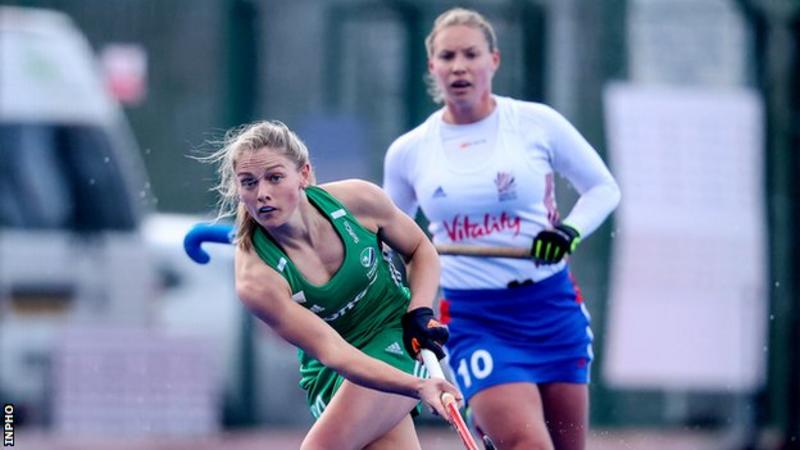
Ireland's Chloe Watkins and Great Britain's Sarah Robertson
Ireland beat Olympic champions Great Britain 2-1 in Belfast on Sunday to level the series between the teams at one win apiece before Tuesday's deciding contest at Queen's University.
Laura Unsworth converted Sarah Evans' cross at the back post to put GB ahead four minutes before half-time.
Chloe Watkins levelled three minutes into the third period with a fine finish into the bottom corner.
Roisin Upton fired home the decisive penalty stroke with six minutes left.
Upton beat GB goalkeeper Maddie Hinch low to her right to secure victory for the hosts after Anna O'Flanagan had been brought down.
It was Ireland's first triumph over GB, whom they are scheduled to meet at the Olympic Games in July.
Great Britain had come from a goal down to beat Ireland 2-1 in the first match of the series at the same venue on Saturday.
The first quarter was an end-to-end affair with the best chance falling to Unsworth, who saw her shot heroically cleared off the line by Lena Tice in the fourth minute.
Ireland passed up a good opportunity to go in front in the second quarter when Lizzie Colvin's close-range effort was well saved by Hinch.
Ireland goalkeeper Ayeisha McFerran also produced a number of fine saves to deny the visitors.
Great Britain broke the deadlock when Shona McCallin showed great skill to execute a 'show and go', before Evans played a fine ball into the circle for Unsworth, who got the final touch.
Colvin set up Watkins for her equaliser, then both sides went close, McCallin missing a good opportunity and Hinch making a wonderful save from O'Flanagan.
Upton's successful penalty stroke put Sean Dancer's side in the driving seat and Ireland withstood late GB pressure to set up a thrilling contest on Tuesday (15:00 GMT), again to be shown live on the BBC Sport website and BBC iPlayer.
What they said
Ireland coach Sean Dancer: "Obviously I'm pleased with the result but what I'm most happy about is the way we played.
"This game was about really stepping it up and taking it more to GB. I was really pleased to see us do that.
"GB are a very good team so we are where we want to be with a chance to win the series. GB will step it up again on Tuesday so we know we are in for a big challenge."
Ireland captain Katie Mullan: "We have never beaten GB before and to do it on home soil is even more special.
"I'm so proud of our performance and the character shown by the girls in the second half in particular."
BBC Sport
Kookaburras, Hockeyroos to play in Ausdrill & Fortescue Challenge
The Kookaburras and Hockeyroos will hold intra-squad matches with ‘some razzmatazz’ this weekend as part of their Tokyo 2020 preparation.
The joint series, which has been named the Ausdrill & Fortescue Challenge, is designed to emulate as close to proper international matches as possible.
The Kookaburras squad will split into two teams for a three-match series (starting with Match 1 tomorrow night Tuesday 16 March) at Perth Hockey Stadium.
The Hockeyroos will play two intra-squad matches as part of double headers with the Kookaburras on Saturday and Sunday.
The Kookaburras and Hockeyroos have not played an international match since March last year due to COVID.
This intra-squad series will feature a host of elements standard to an international match in order to provide the players an opportunity to compete in an atmosphere they have not experienced in 12 months.
“While this series sees the players up against similar squad members, they’re evening games and there’s a bit of razzmatazz around the matches…there will be player introductions, official umpires and spectators so we’re hoping these add a different element,” said Kookaburras Head Coach Colin Batch.
“We’re pleased we can provide this to the players in lieu of international matches that we haven’t been able to secure. It’s as close as what we can duplicate at the moment without playing a proper international.”
The series is also crucial regarding selection three months out from the Olympic hockey teams of 16 athletes being announced.
The intra-squad Ausdrill & Fortescue Challenge Trophy could be one of the last times Australia’s flagship national teams are in action on home soil until Tokyo.
Hockeyroos Head Coach Paul Gaudoin says the series is vital for his group in taking the improvements and intensity from training into a full-on match scenario.
“The girls have been training really well but you need games to gauge your progress and this weekend gives us the opportunity to implement what we have been working on,” said Gaudoin.
“With the uncertainty and limitations due to COVID, you need to adapt and manage with the cards you are dealt, so we look forward to two really competitive hit outs.
“Hopefully the Perth sporting public can come out and support the players by contributing to an atmosphere that we would see if we were playing in a proper international tournament.”
Entry is a gold coin donation with all money raised going to nominated charities of Ausdrill and Fortescue, the Lord Mayor’s Distress Relief Fund (LMDRF) and Ronald McDonald House Charities respectively.
Ausdrill & Fortescue Challenge
Perth Hockey Stadium
Tuesday 16 March 2021
4.30pm Kookaburras Match 1
Saturday 20 March 2021
6.00pm Hockeyroos Match 1
7.45pm Kookaburras Match 2
Sunday 21 March 2021
5.00pm Hockeyroos Match 2
6.45pm Kookaburras Match 3
Entry is a gold coin donation.
Gates open 30 minutes before the first match.
Hockey Australia media release
1975 Hockey World Cup: Unfancied India stuck to the task to script glory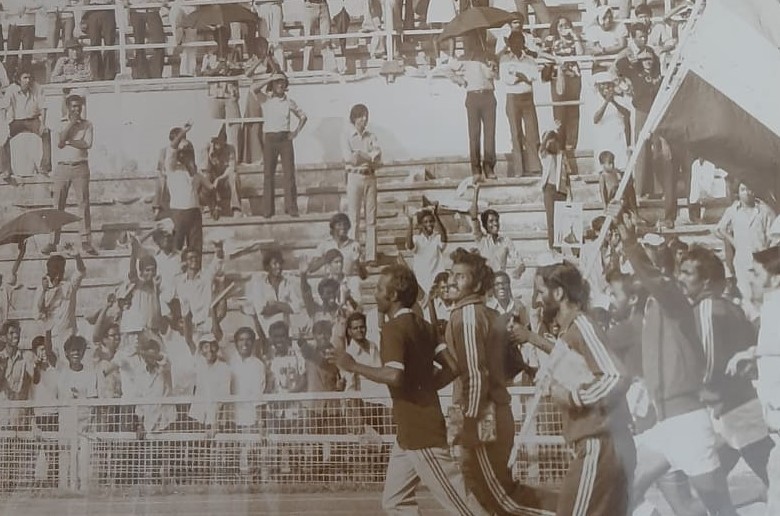
India set off for Kuala Lumpur in a low-key atmosphere. There was no hype and expectation tepid. Certainly pale compared to that in 1973 when the team looked good to win the title.
A departure story fell to the bottom of the page in the Times of India which covered the team’s flight to the Malaysian capital from Chennai. It was headlined: “Indian team leaves for World Cup with hope in their hearts”.
Hope, it was, that carried the team all the way to the title in a fiercely fought, though fascinating tournament affected by torrential rain but managed admirably by the Malaysian Hockey Federation which juggled the schedule and prepared playable surfaces amid the ravages of the weather.
Much attention was diluted by the sad state of affairs in the administration. Infighting saw two factions of the IHF, prompting the IOA to take control and send the team under its banner. Bad enough, the World Cup which had been awarded to Bombay (now Mumbai) was moved to Kuala Lumpur because of administrative anarchy.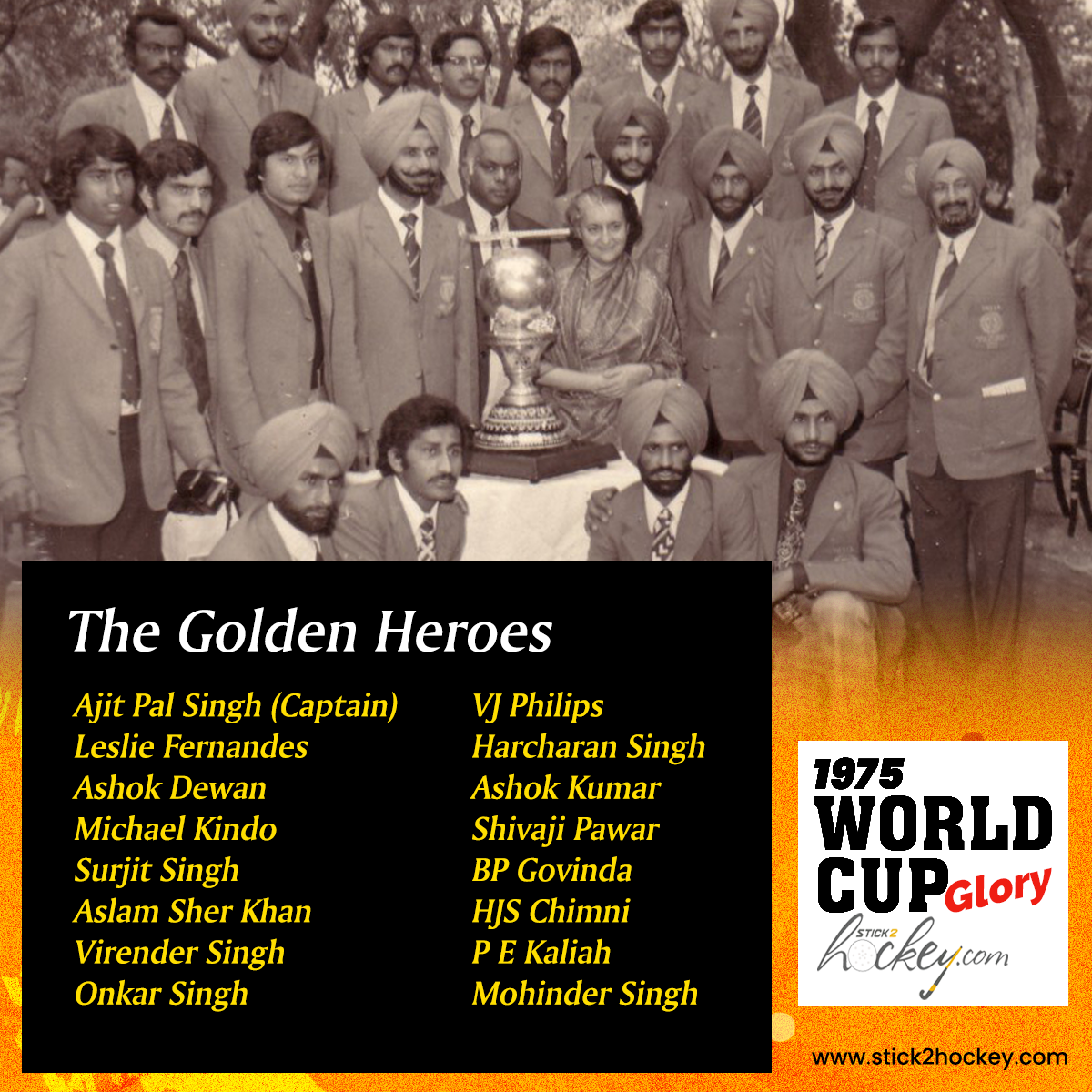
Victorious Indian team
The build-up to the World Cup was eclipsed by the India-West Indies cricket series and hockey was all but under the radar as the team set out to better their silver medal at Amsterdam 1973 where they lost the final to hosts Netherlands in a heart-breaking tie-breaker.
The team, unlike two years earlier, was far from the best. It was all too obvious that the quota system had its say. There were some queer selections but the core group comprised players like captain Ajitpal Singh, forwards Govinda, Ashok Kumar, VJ Philips and Harcharan Singh and full backs Surjit Singh and Michael Kindo who were world class.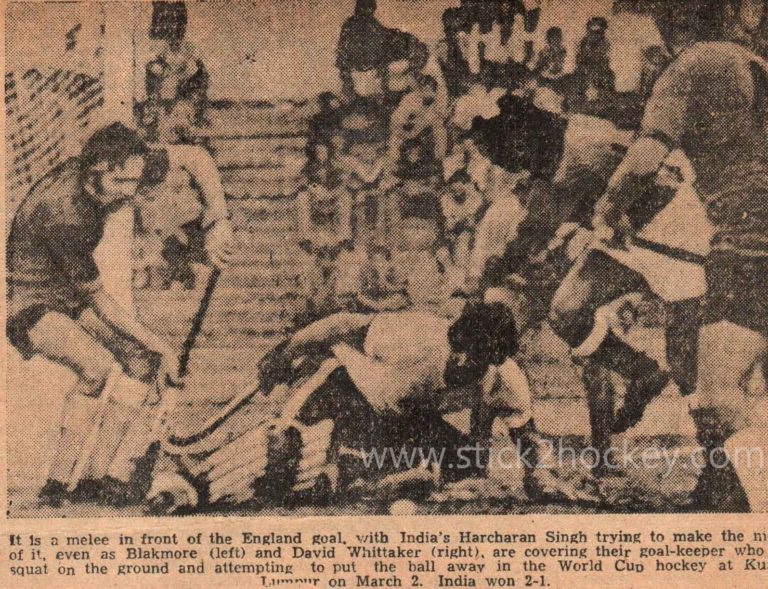
Action packed India-England encounter
There were able deputies too such as Aslam Sher Khan who would be immortalized for feats at the event and a little known Mohinder Singh who would succeed where India failed at Amsterdam – converting penalty strokes with minimum of fuss.
The team, though, began in scratchy manner. A 2-1 win over England was achieved only after scoring both goals from penalty strokes. The next match against Germany was abandoned with India leading 1-0 and replayed as the concluding pool match.
Playing Australia next, India were perhaps relieved at the final hooter with the scores level 1-1. But with Ghana and Argentina coming up next, hopes soared at sealing a semifinal spot with a degree of ease.
A 7-0 win over Ghana kept things on course but what came next shook the Indian camp. A 1-2 defeat to Argentina opened up the possibility that India may not make the semifinals for the first time in a major championship.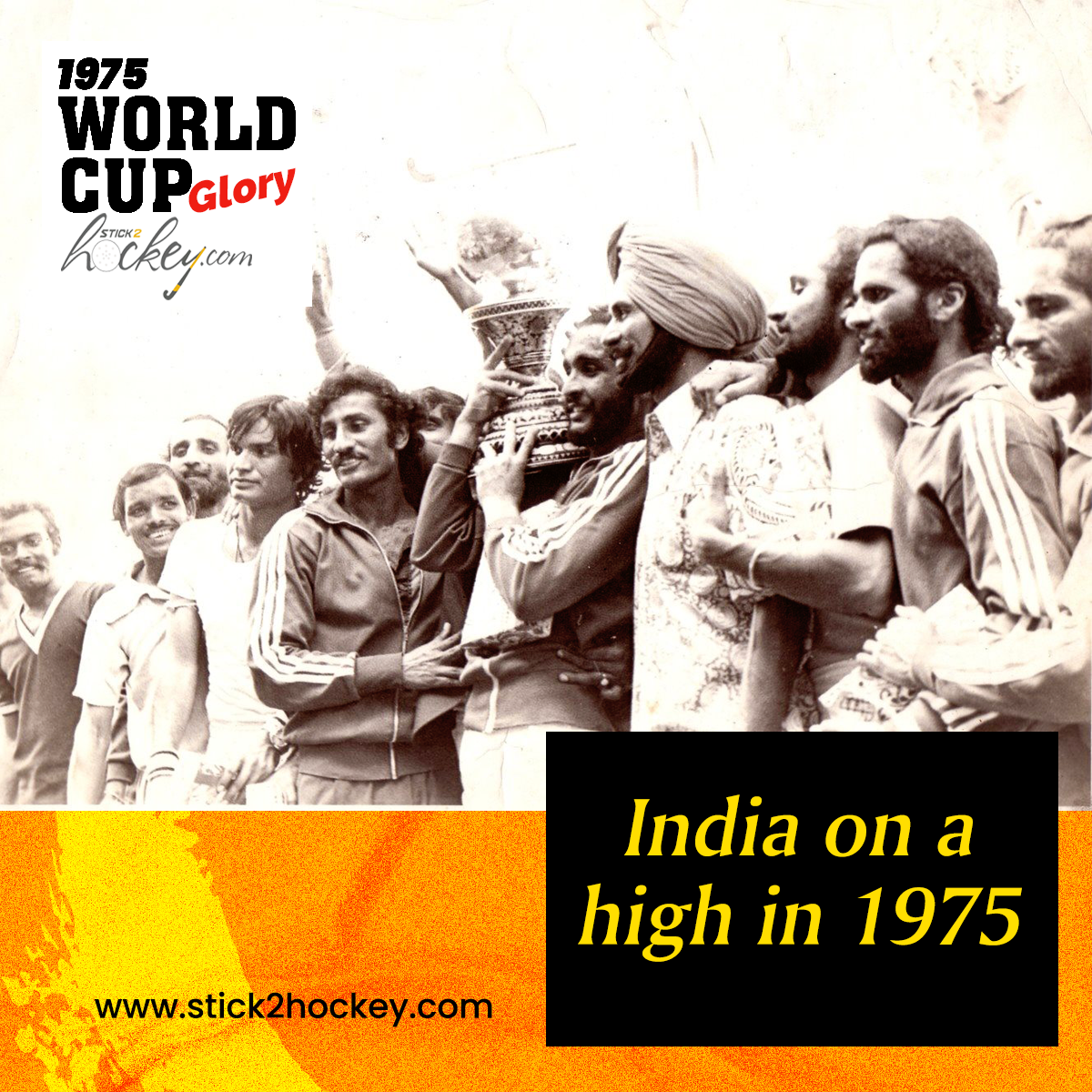
1975 World Success story
But the tide turned. The team came to terms with itself and put in a scintillating performance in a 3-1 win over West Germany to make the last four.
They leapfrogged the Germans to top the pool and may not have been entirely comfortable with the thought of playing hosts Malaysia in the semifinals.
Malaysia had come through a tight pool as runners-up to Pakistan, while defending champions Netherlands fell by the wayside, finishing bottom out six teams (eventually finishing ninth).
For the second time, India experienced match abandonment and that happened after only nine minutes against Malaysia. In the replay the following morning, India made the final by the skin of their teeth – Aslam rescuing the side by coming on as substitute and converting a penalty corner with only four minutes remaining.
Harcharan then scored the match-winner in extra-time before Aslam sealed and endorsed India’s passage into the final against Pakistan with a goal line save from a Malaysian penalty corner.
Pakistan, had their stuttering moments – like the 3-3 draw with the Netherlands, 2-2 against Poland and a fortuitous 2-1 win over Malaysia. But they strode majestically to a 5-1 win over Olympic champions West Germany in the semifinals and looked odds-on-favourites to win the final against India.
And so it appeared. At half-time Pakistan led 1-0 and there were consternations in the Indian camp at half time. But India returned to the pitch after the interval a team transformed, perhaps reaping dividends from the legend and manager Balbir Singh Sr’s pep talk in the dugout.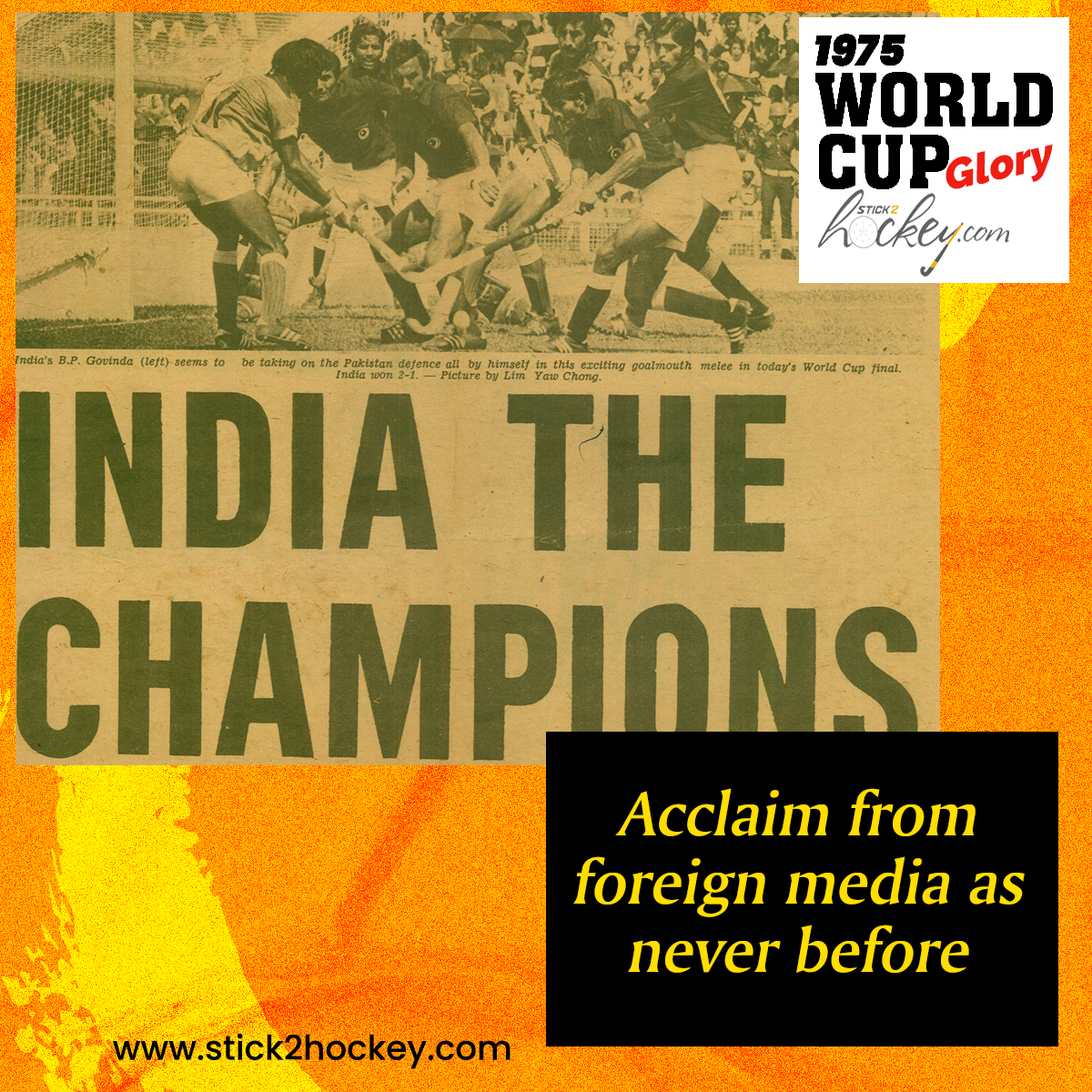
1975 World Success stores dominates media
Surjit and Ashok scored in the second half to overturn the lead and if a chance or two were converted – Shivaji Pawar’s miss from hand-shaking distance for example — India could have won on a canter.
Critics may point to a depleted Pakistan forward line after injuries had their say – Samiullah Khan their ace on the left wing had to withdraw after a collision with right-half Varinder Singh, leaving only Ishlahuddin at right winger as sole survivor of a famed quintet which included Abdul Rashid and Shahnaz Shaikh.
Then there was a touch of controversy to Ashok Kumar’s match-winner but there was no denying India the crown they deserved for a performance renowned journalist Ron Hendricks described as, “35 minutes to glory” in The Indian Express.
Stick2Hockey.com
On This Day: India beat Pakistan to win their maiden Hockey World Cup in 1975
The title clinch remains India's only World Cup win till date. It was also the first major victory for Indian hockey in those days after a long gap.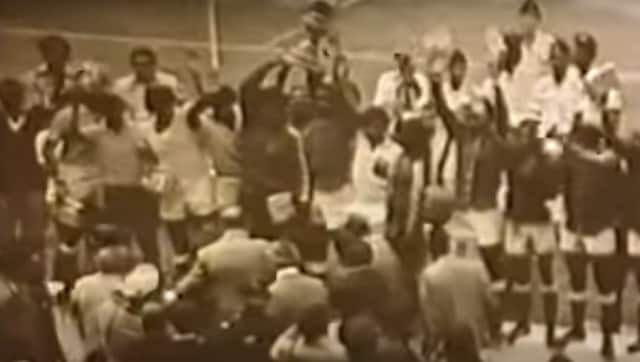
India team lift the trophy. Youtube screengrab
On this day, 15 March in 1975, Indian men's hockey team led by Ajitpal Singh created history as they beat Pakistan in the final at Kuala Lumpur to lift the World Cup trophy for the first time.
The World Cup was introduced in year 1971 only but India had failed to make the cut to the final in the first edition, losing to Pakistan in the semi-finals.
In year 1973, India went one step closer to the title, but went down to the hosts The Netherlands in the final.
In 1975, Indians had prepared well for the tournament, sweating out in one month camp held at Panjab University in Chandigarh.
Indian hockey legend Balbir Singh Sr was the architect of the title clinch in Malaysia. The team trained under his watchful eyes at the University and he was also named the manager of the team for the third edition.
India beat the hosts Malaysia in the semi-finals of the tournament to reach the final where they met the arch-rivals Pakistan.
In the semi-finals, India were trailing 2-1 with only a few minutes remaining in the match before Balbir Singh introduced Aslam Sher Khan in the match and he scored equaliser for India through a penalty.
Harcharan Singh hit the third goal for India in the extra time to take the country into the final.
In the final against Pakistan, India again conceded a goal early but thanks to Surjit Singh, equalised soon.
A few minutes later, Ashok Kumar scored the decisive second goal for India. Pakistan though protested about the goal as it hit the goal post before crossing the goal-line. The Pakistanis believed the goal-line was never crossed. However umpire G Vijayanathan had no doubts in his mind that it was a clean goal.
The title clinch remains India's only World Cup win to date. It was also the first major victory for Indian hockey in those days after a long gap. India had clinched two back-to-back bronze medals at the 1968 and 1972 Olympics and it is believed that the two Games saw the decline in Indian hockey as the team had clinched gold medal continuously in Olympics from 1928 to 1956, winning a silver in 1960 and then coming back on top in 1964 again. However, bronze medals had hurt the pride of Indian hockey in those two Olympics.
The World Cup win restored the pride to some extent and brought smiles back on Indian hockey fans' faces. The fact that India beat arch-rivals Pakistan in final also added to the momentous occasion.
Firstpost
46th Anniversary of 1975 World Cup win: 46 facts you should know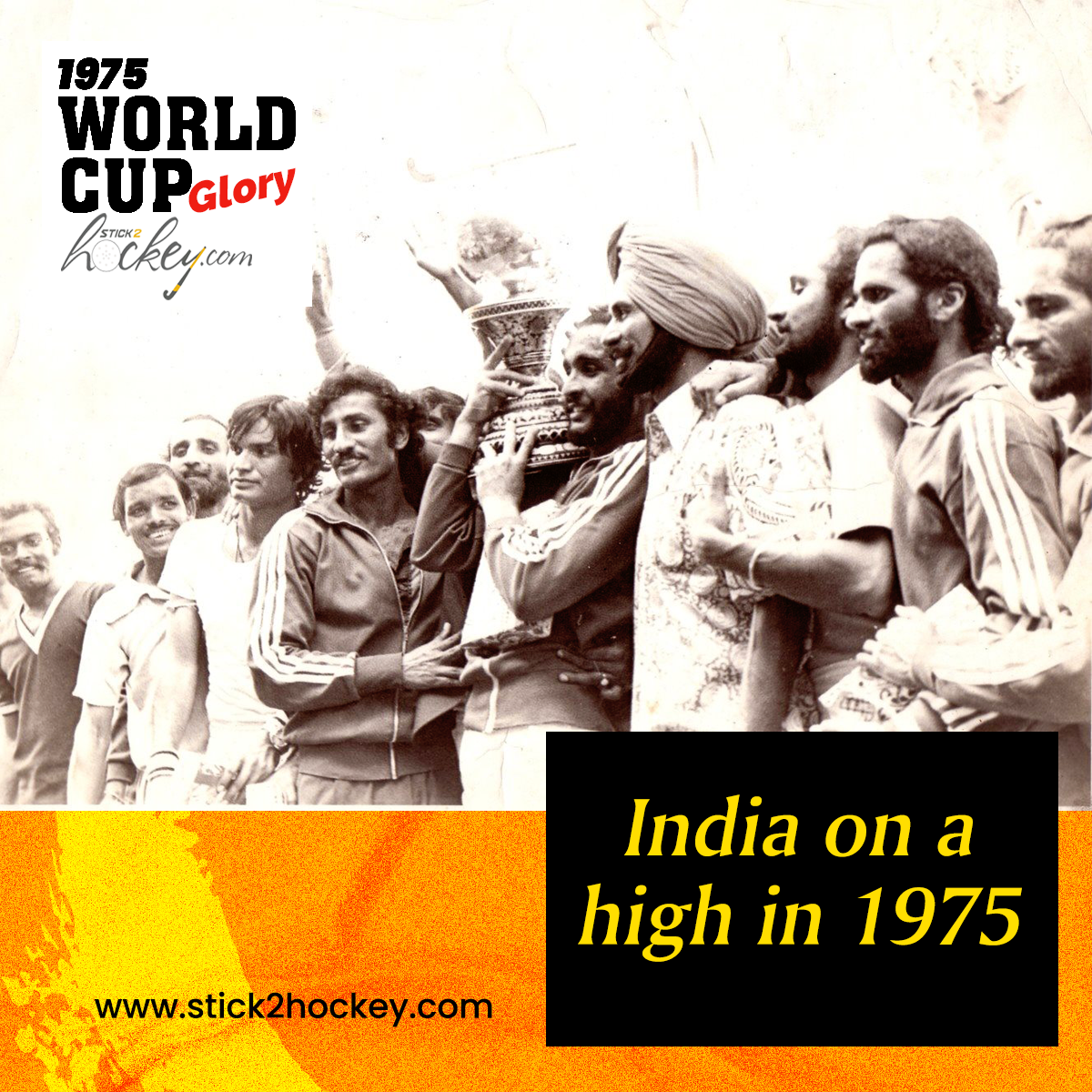
1. India played arch rivals Pakistan in the final for the first and only time in the World Cup history
2.Two of India’s matches were abandoned and replayed (Vs West Germany and Vs Malaysia, Semis)
3. India beat West Germany 3-1 in the concluding league match to top the pool
4. Aslam Sher Khan came on as substitute to convert a penalty corner at the day end to take the semifinal against Malaysia into extra time.
5. Harcharan Singh scored the match winner in extra time against Malaysia to take India into the final
6. Mumbai was the original venue of the World Cup which was moved to Kuala Lumpur
7. India emulated Pakistan by winning the World Cup after losing rights to host the event (Pakistan won in Barcelona in 1971 after Lahore was the original venue).
8. India converted all penalty strokes in KL unlike in Amsterdam where they missed many.
9. It was second time for Ajitpal Singh to lead India at the World Cup and doing the same in 1971.
10. India made steady progress from bronze (1971), silver (1973) and finally gold (1975)
11. India lost to Argentina for the first time in a major tournament
12. The World Cup was played in Asia for the first time in 1975
13. The Indian camp was held in Patiala
14. Legendary Balbir Singh Sr, was manager and de facto head coach of the India team
15. India beat England 2-1 in the opener, both goals from penalty strokes
16. India were held to a 1-1 draw by a young Australia, average age 22
17. India beat Ghana 7-0 for their largest win in the KL World Cup
18. Indians were able to score in crucial ties despite odds
19. Ashok Dewan was goalkeeper in the final, replacing first-choice Leslie Fernandes
20. 70,000 watched the final at the Merdeka Stadium, a record equalled later in 1990 (Lahore)
21. Defending champions Netherlands finished 9th.
22. India went to KL under the IOA banner as the IHF was dysfunctional amid infighting
23. Ashok Kumar scored the match winning goal against Pakistan in the final in the 51st minute
24. Pakistan took the lead in the final the 17th minute through Saeed Zahid
25. Surjit Singh equalised in the 45th minute from a penalty corner
26. Ajitpal Singh cleared the ball from within India’s circle a split second before the final hooter
27. Aslam Sher Khan revealed that his penalty corner goal to rescue India in the semi-final against hosts Malaysia was a mis-hit!
28. Harcharan Singh struck the match winner in extra time against Malaysia to make it 3-2 after right winger VJ Phillips cross wasn’t intercepted by the Malaysian defence
29. Manager Balbir Singh made each player carry a piece of cloth in their pockets for good luck before the final
30. The team arrived in Chennai from KL where it was held up by customs for considerable time, irking captain Ajitpal and his teammates
31. Four India players — Ashok Kumar, Michael Kindo, Ajitpal Singh and Harcharan Singh won gold at KL to add to silver and bronze each at the first and second World Cups
32. Malaysian PM Tun Abdul Razaak presented the World Cup to Ajitpal Singh
33. PM Indira Gandhi invited the triumphant team over but pointed out to a distortion in the map of Kashmir on the globe of the magnificent trophy donated by Pakistan
34. India scored 19 goals and conceded 8 at KL 1975
35. Onkar Singh, left half, was the youngest in the squad. Oldest was HJS Chimni
36. Railways contributed maximum players to the India squad
37. Jasdev Singh (Hindi) and Melville D’Mello (English) were AIR commentators at KL 1975.
38. G Vijayanathan (Malaysia) and A Renaud (France) were the umpires for the final between India and Pakistan
39. A collision with India right half Varinder Singh rendered the legendary Samiullah Khan hors de combat in the final
40. After rain marred much of the tournament, the 1975 KL final was played in bright sunshine
41. Victory celebrations in India continued for next six months!
42. The victorious Indian team toured many parts of India, the hosts paid hefty fee to IHF
43. Dropping of V. Baskaran was the lone controversy when the team was announced.
44. The 1975 team continues to enjoy celebrity status despite decades having passed by.
45. The team played a match against the top Bollywood stars, which attracted huge crowd
46. Ashok Kumar went on to play his fourth World Cup in 1978.
Stick2Hockey.com
Late goal lifts Maryland field hockey over Penn State, 3-2
Shane Connuck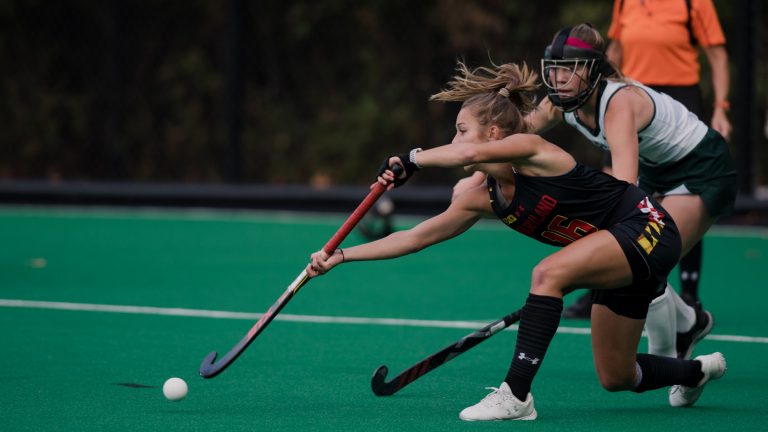
Midfielder Emma Deberdine passes the ball in Maryland Field Hockey’s 5-1 win over Michigan State on Oct. 25, 2019. (Gabby Baniqued/The Diamondback)
With just over two minutes left in Sunday afternoon’s match, Emma DeBerdine received a pass as Maryland field hockey’s attack charged downfield. The sophomore was in traffic, and had three Penn State defenders around her.
She saw a wide-open Bibi Donraadt dashing toward the cage and dished the ball over. The junior forward flipped the ball right past goalkeeper Brie Barraco and raised her right arm in celebration immediately.
Donraadt’s game-winning goal gave the Terps a hard-fought 3-2 victory over Penn State on Sunday.
“Gaps opened up in the field everywhere,” Donraadt said. “Emma did a great job pulling the defenders toward her, and because of that, the ball was deflected, and I was there.”
They had zero penalty corners through the first 57 minutes. They were outshot by nine. But as coach Missy Meharg has talked about, the Terps needed to score more goals, and their highest goal total this year gave them a big win over a quality opponent that shut them out two days ago.
“We were, first of all, just fired up,” Donraadt said. “Penn State-Maryland is always a big deal. We played some great segments of hockey.”
Maryland (3-3) was coming off a two-game skid, as it dropped its second match Northwestern last Sunday and was blanked by Penn State (2-3) on Friday. Its last win came March 5 against Ohio State, when strong defense and goals in the first and final minutes lifted it to a shutout victory.
Since that win, it hadn’t scored a first-period goal. Until Sunday.
Just under four minutes into the match, Maura Verleg dragged in a pass toward the cage from the center. Forward Bibi Donraadt was there to send the ball into the back of the net past goalkeeper Brie Barraco, who handled all seven of the Terps’ shots on goal Friday.
“[Barraco] comes really low,” Donraadt said. “So we knew to react quick, like what I did with the first goal.”
And they didn’t stop there. After being held scoreless 48 hours earlier, the Terps had already broken through on Barraco — and their offense just kept rolling.
Maryland’s attack continued to pressure the goalie. Forward Mayv Clune fired several shots toward her, but couldn’t connect. Eventually, midfielder Emma DeBerdine saw an opening and the sophomore knocked in her first goal of the season.
“We’ve also worked on really staying present,” Meharg said. “Forget the score. You need to take care of one time, one chance.”
The Terps defended their lead, taking five shots on goal by late in the second period. But Penn State’s offense, led by Anna Simon — who scored a goal and picked up an assist Friday — wasn’t going to stay silent for too long.
Twenty minutes into the match, Bree Bednarski headed to the backline to insert the Nittany Lions’ second penalty corner of the afternoon. Elena Vos set up a shot for Simon, who sent it past a diving Noelle Frost. Penn State was on the board, cutting the Terps’ lead in half.
Despite Maryland’s lead on the scoreboard, it didn’t earn a single penalty corner for the entire first half. Meanwhile, the Nittany Lions had five, along with 12 total shots.
About six minutes after the Simon goal, Bednarski lunged toward the ball after it was deflected. She took a half-step in front of her defender and dragged a shot toward the cage. As the senior forward fell to the pitch, she watched her shot sail past Frost — knotting the match at two.
And the teams remained tied until halftime, with the Terps matching their highest score of the season coming before the second period had even started.
“The attack was opportunistic,” Meharg said. “The piece that made it so much easier for us just to be opportunistic was the level of support from the midfield.”
Seven minutes into the second half, Maryland tried to get its offense going again. It still had yet to draw a penalty corner, and was being outshot, 14-6. And its commanding 2-0 lead had already been shattered.
Emma DeBerdine was looking for her second goal of the match, but Penn State’s strong defense again kept the Terps away from the cage and quickly went back to pressuring Frost.
The action quieted down in the third quarter. Defenses began to shine again, and Maryland still had not drawn a single penalty corner.
With just over six minutes left, Penn State drew its eighth penalty corner of the match. The Nittany Lions worked the ball to Simon, whose shot was blocked — and the second half stalemate continued.
Nearly fifty-seven minutes into the match, the Terps drew their first penalty corner. Bibi Donraadt headed to the backline for the insertion, and the ensuing shot by Riley Donnelly was handled by Barraco.
And in the 58th, the breakthrough came. Though Maryland had been outshot, Donraadt snagged the winner, scoring the only goal in an otherwise tight second half. And it was all the Terps would need to get their revenge after being shutout Friday.
“They didn’t care that they had given up the two goals and it was 2-2,” Meharg said. “They just kept playing. And I’m really proud of them for that.”
The Diamondback
Field Hockey Tops Drexel With Borneman's First Career Goal
PHILADELPHIA - On a windy Sunday afternoon at Howarth Field, the Temple field hockey team defeated head coach Susan Ciufo's alma mater for the second-straight season. Sophomore Sydney Borneman found the back of the cage for her first career goal, and the Owls improve to 4-5 after a 2-0 weekend.
Recapping the Game
> Temple's offense came out hot, with Borneman scoring at the two-minute mark in the first quarter.
> The Cherry and White defense stood tall, holding the Dragons to just three shots in the first half and only one shot on target.
> The team's defense remained tough after halftime, allowing just one shot in the third quarter and four in the fourth.
> Temple had a great offensive effort, firing 15 shots with seven on goal, but Drexel made six saves to keep the score 1-0.
Statistically Speaking
> Temple's 15 shots tied for the season-high, as did the seven shots on goal.
> Myrthe Schuilenburg and Claire Thomas each fired a team-leading three shots each, while Taylor Alba had a team-high two shots on target.
> The Owls allowed just five penalty corners, successfully defending them all.
> The Cherry and White's nine penalty corner attempts tied for the most this season.
> Cristina Carotenuto made three saves in the cage and earned her third clean sheet of the season.
Quotable
> "We are excited to walk away with two wins this weekend. Drexel is a great team that had a massive amount of speed today. We had really great moments, but Drexel was able to threaten our circle immensely. Moving forward, we will be working on our overall urgency upon turnover and winning the ball in order to generate goal-scoring opportunities from opposing teams." – Temple head coach Susan Ciufo
Next Up
> Temple will open a six-game road stretch at Delaware on March 21 before returning to BIG EAST play.
Owl Sports
Field Hockey Comes From Behind to Beat Delaware, 3-2, in Overtime
Celeste Smits scored her first goal as a Hawk in overtime on Sunday
NEWARK, Del. – Celeste Smits found the back of the cage with just under three minutes remaining in overtime to give the Saint Joseph's field hockey team a 3-2 come-from-behind victory over Delaware at Rullo Stadium on Sunday afternoon.
HOW IT HAPPENED
• Neither team got anything going in the opening frame, but Delaware (0-1) got on the board a minute and a half into the second quarter after Femke Strien converted on a corner.
• The lead would hold until just after halftime, when Anna Miller tallied her first career goal to bring the Hawks back level.
• Despite Saint Joseph's (2-1) having most of the possession through the third, it was the Blue Hens that went ahead when Ellie Schepens scored on a corner with 13:14 to play.
• Leigh James answered almost immediately, putting a ball from Smits past Lizzie Gaebel to once again tie the game.
• The Hawks had the better of play over the remainder of regulation, but the game went to overtime knotted at 2-2.
• In the extra frame, the Hawks weathered an early penalty corner before Smits converted on a reverse from the top of the circle to give the Hawks the victory.
BEHIND THE BOX SCORE
• Robin Bleekemolen made one save on the afternoon, while the Hawks forced Gaebel into eight.
• The Hawks outshot the Blue Hens 16-9, with a dominant 11-2 advantage in the second half. Both teams earned four penalty corner opportunities in the game.
• Smits finished with a three-point afternoon, as did Strien. Strien's six shots were a game-high, while Smits and Miller notched three each to pace the Hawks.
HAWK TALK
"Thank you to Delaware for a great game and well-executed corners," head coach Lynn Farquhar said. "We had to hone in and focus our game. Our Hawks punched back after both UD goals, committed to play simple, create, and finish moments. Today was a step forward for us as a team, and I am proud of the fight and belief."
UP NEXT
The Hawks head to New England next, with matchups at UMass and UConn on Saturday and Sunday, respectively.
SJU Hawks
Hockey trio set for success in world of business
Three international female hockey players have won coveted places on a unique intern programme, run by international business solutions company EY.
The programme – the EY Women Athletes Business Class of 2021– aims to support elite athletes as they make the transition from a sports career to a career in business. For the 2021 programme, applications were made by female athletes from a wide range of sports from all across the globe, with just 15 athletes being selected for the prestigious programme. The trio of successful athletes from hockey are Janne Müller-Wieland of Germany, Hollie Pearne-Webb of England and Great Britain and Aki Yamada from Japan.
Hockey was the only sport with three representatives, and along with cricket and beach volleyball, one of three team sports to have representation on the course.
Talking about why she felt hockey was so well represented on the course, Müller-Wieland said: “I think team sports in general might have an advantage in the business world because they naturally know how to move in [a team environment] and perform as a team – I don’t believe that EY chose depending on your sport though, which is great. I feel hockey players are more used to thinking about things outside their sport as well, though. Since we are often not professional full-time athletes, it gives us time to study or gather work experience at the side.”
Both Müller-Wieland and her British counterpart Pearne-Webb currently balance careers in business alongside their hockey careers. The German captain is a successful entrepreneur and businesswoman, with her own start-up company, Unthink, and a role for Intel as a Technology in Sport Ambassador. Pearne-Webb works part-time for the UK government’s Department for Food, Environment and Rural Affairs. Yamada has spent much of her adult hockey-playing career in Australia and England, although as Japan builds up for a home Olympic Games, she is now playing for the Coca Cola Red Sparks in Japan.
For all three athletes, the rescheduled Olympic Games Tokyo 2020 will be at the forefront of their minds, but they are also approaching a time when hockey might start to take a back seat and that can be a daunting prospect. As Pearne-Webb says: “I am expecting a transition out of sport to be incredibly hard, I am dreading it because I love my job as an athlete.
“But, while it will be hard, at least there is something else there; something else in the locker. I also think it will keep me in sport for longer because I already have something else going on. I won’t have to start a career completely from scratch, so I won’t have to leave sport to find something else.”
The EY programme is a mix of webinars, workshops and a mentor programme – each athlete is paired with a mentor according to their career aspirations. Mentees are taught how to translate their experiences in sport into business excellence. They also identify their strengths and set clear goals for their future.
“One of the biggest things is understanding your value outside of sport,” says Pearne-Webb. “For a lot of athletes, when they retire, the biggest issue is lost identity and feeling valued. Joining a programme like this, with the competition for places, you have sort of enjoyed a level of success already. It also helps us understand what we can bring from the sports world. My mentor has already spoken about what she can learn from me and some of the lessons I have learnt in sport.”
Müller-Wieland adds: “I think in general it is great to exchange experiences, thoughts, challenges with fellow female athletes from around the world who are at different stages of their life and career. There is a lot we can learn from each other. On top of that, access to EYs smartest leaders and the workshops we do together is unique and gives us a completely different input again which can pave the way for our personal future careers.”
The benefits of the course are not one way. Kirsty Ingram is Global lead of the EY Athlete Programme and she says: “I am acutely aware of how sport has helped shape my own professional career. Resilience, confidence, passion, leadership and an unwavering focus are qualities elite athletes possess and qualities that the business world requires.”
For other athletes who are approaching a life away from the hockey pitch, Müller-Wieland has this advice: “My advice is to start early to get curious about things outside of your sport. If you can study on the side – even if it takes twice as long – do it. If you can gain some work experience, even for just one day a week or mini-internships, do it. If you have a hobby, which is not your sport, that you really enjoy, do it.
“Speak to many people, learn about what they do, be open minded, build your network… This will help massively at the end of your career because you will get a feeling of what you are interested in, what you enjoy, what you are curious about or even good at. Meeting people and staying in touch is a great advantage of being an athlete – people will take the time for you, so start having those conversations, you never know what the future might bring.
“Also, don’t underestimate the incredible experience you bring from your sport. Athletes are usually very good learners, so you will probably learn quite quickly the skills you need for the job; the “soft skills” however are already instilled in you from your sport background, which are way more important and much harder for others to catch up on. So, believe in yourself, you are a great asset to your employer.”
FIH site